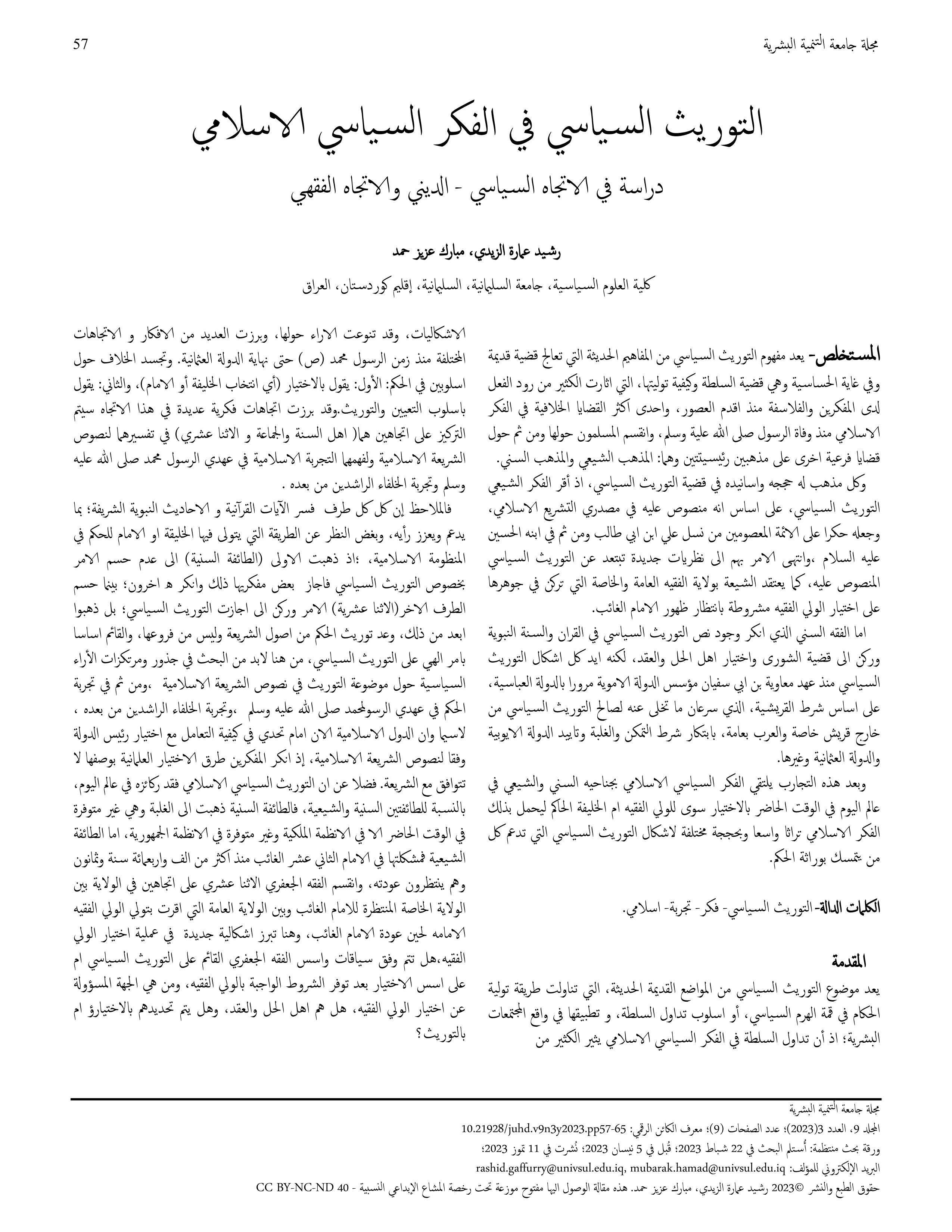Political inheritance in Islamic political thought
A study in the political religion trend and the jurisprudential trend
DOI:
https://doi.org/10.21928/juhd.v9n3y2023.pp57-65Keywords:
Political inheritance , Thought , Experience , IslamicAbstract
The concept of political inheritance is one of the modern concepts that address an old and very sensitive issue, which is the issue of power and how to assume it, which has provoked a lot of reaction among thinkers and philosophers since ancient times, and one of the most controversial issue in Islamic thought since the death of Prophet, may God bless him and grant him peace, and Muslims were divided around it and then on other sub-issues on two main sects, namely: Shiite sect and Sunni sect.
Each of them has its arguments and chains of support in the issue of political inheritance, as the Shiite thought approved political inheritance, on the basis that it is stipulated in the two sources of Islamic legislation, and made it the monopoly of the infallible imams of the descendants of Ali Ibn Abi Talib and then in his son Hussein and ended up with them to new theories moving away from the political inheritance stipulated as they believe to the public and private guardianship of the jurist, which relied in essence on the choice of the guardian jurist conditional on waiting for the appearance of the adsent imam.
As for Sunni jurisprudence, which denied the existence of the text of political inheritance in the Quran and the Sunnah of the prophet and cornered on the issue of Shura and the choice of the solution and the contract, but supported all forms of political inheritance since the era of Muswiya bin Abi Sufyan, founder of the Umayyad state through the Abbasid state, on the basis of the condition of the Quraysh, which he quikly abandoned in favor of political inheritance from outside the Quraysh in particular and the Arabs in general, by inventing the condition of mastery and dominance by supporting the Ayyubid state, the Qttoman Empire and others.
After these experiences, Islamic political thought meests its Snni and Shiite wings in today’s world at the present time by choosing only the wail al-faqih or the ruling caliph, so that Islamic thought carries a wide heritage and with different arguments for forms of political inheritance that support everyone who adheres to the inheritance of power.
References
المصادر العربیة
اولاً/ الکتب الاسلامية:
القرآن الكريم.
الثانياً/ الموسوعات:
الجاسور، ناظم عبدالواحد، ) ٢٠١١(, موصوعة المصطلعات السياسية والفلسفية والدولية، دار النهضة العربية، ط٢، بيروت- لبنان.
الثالثاً/ الكتب العربي:
الماوردي، أبى الحسن علي بن حبيب البصري البغدادي، (بلا سنة)، الاحكام السلطانية والوليات الدينية، دار الارقام بن ابي الارقام، بيروت- لبنان.
أركان مهدي عبدلله، إشكالية السلطة وبناء الدولة في الفكر السياسي الشيعي، المديرية العلمية للتربية، بلا دار الطبع والنشر، ذيقار، بلا سنة.
السيف، توفيق، (٢٠٠٢)، نظرية السلطة في الفقه الشيعي، المركز الثقافي العربي، بيروت- لبنان.
المعلون، سامي بن عبدالله بن أحمد، (١٤٢٤ھ)، اطلس الخليفة ابي بكر الصديق رضى الله عنه، مكتة العبيكان، الرياض.
الساموك، سعدون محمود، (٢٠٠٦)، في المذاهب الفكرية المعاصرة، دار وائل للنشر والتوزيع، الاردن- عمان.
عبدالحميد، عرفان، (١٩٩٧)، دراسات في الفرق والعقائد الاسلامية، دار البشر، عمان.بلا
عرنوس،غسان سليم، (٢٠١٧)، النظم السياسية السلطة والمسؤولية بين ثوابت الاسلام ومتغيرات الغرب، دار الاعصار العلمي، عمان- الاردن.
الفضيلي، صلاح مهدي علي، (٢٠١٠)، المرجعية الدينية ودورها الوطني في تاريخ العراق الحديث والمعاصر ١٩٠٠-٢٠٠٢، مؤسسة مصر مرتضى للكتاب العراقي، القاهرة.
الوادعي، محمد الصياد وسليمان، (١٤٤٣هـ). اللاهوت السياسي الشيعي وأزمة الشرعية في أيران، المعهد الدولي للدراسات الإيرانية (رصانة)، مكتبة الملك فهد الوطنية أثناء النشر، الرياض.
عمارة، محمد، (٢٠٠٩)، في النظام السياسي الاسلام: الخلافة...الدولة المدنية...الشوري...الديمقراطية...المواطن، مكتبة الإمام البخاري للنشر والتوويع، القاهرة.
عمارة، محمد، (١٤٣٣)، ھ محمد صلى الله عليه وسلم الرسو..السياسي، مجاة الازهار المجانية لشهر، بلا اسم مكان المطبعة، ربيع الاول.
عمران و اخرون، محمود سعيد، (١٩٩٩)، النظم السياسية عبر العصور، دار النهضة العربية للطابعة و النشر، بيروت.بلا
النيسابوري القشري، مسلم بن الححاج أبو الحسن، المسند الصحيح المختصر بنقل العدل عن العدل الى رسول صلى الله عليه وسلم، دار احيا التراب العربي- بيروت. بلا
الزحيلي، وهبة، (١٩٩٧)، الفقه الاسلامي وأدلته، ج٨، دار الفكر المعاصر، بيروت- لبنان.
الرابعاً/ الكتب المعربة:
اركون، محمد، ت: هاشم صالح، الفكر الاسلامي، (١٩٩٨)، دار السافي، ط٣، بيروت- لبنان.
الخامساً/ الإنترنيت:
النراقی، سيرة الملا أحمد بن محمد مهدي، (تأريخ الزيارة (٦/٢/٢٠٢٣)، متاح على الرابط الآتية:
الطبري، محمد جريري، (التاریخ الزیارة ١١/٥/٢٠١٩)، تفسير، دار المعارفة، الموقع المكتبة الاسلامية على الشبكة الانترنيت، متاح علی الرابط الآتیة:
https://www.islamweb.net/newlibrary/display_book.php?flag=1&bk_no=50&ID=1106.
العقائدية، مركز الابحاث، (التأريخ الزيارة ٦/٢/٢٠٢٣)، نمقتطفات من موسوعة حياة المحقق الكركي وآثاره، متاح على الرابط الاتية:
.https://www.aqaed.com/book/425/.
السماوي، مهند، (٢٠٠٨)، الوراثة السياسية (دراسة)، متاح على رابط الاتية:
المصادر الكوردية:
اولاً/ الکتب الكوردية:
رنجیار، ئهحمهد حهمه ئهمین، (٢٠١٣)، جهنگی ههڵگهڕاوهكان، چاپخانهی چوارچرا، سلێمانی.
ئهمین، بورهان محمد، (٢٠١٣)، تهفسیری ئاسان، ناوهندی رۆشنبیری، چ٢٥، بێ شوێنی چاپ.
باپیر، علی، (٢٠١٥)، ئیسلام و دهوڵهتداری، ب٢، نوسینگهی تهفسیر بۆ بڵاوكردنهوه و ڕاگهیاندن، ههولێر.
میسری، فوئاد مهجید، (٢٠١٣)، كۆمهڵگا له سایهی دهوڵهتی خهلافهتدا، دهزگای چاپ و پهخشی حهمدی، چ٤ سلێمانی.
الثانياً/ الكتب المترجمة للكوردية:
عبدالرزاق، علی، (٢٠١٥)، ئیسلام وبنهماكانی فهرمانڕهوایی، و: هاوژین ملا ئهمین و ئارام حاجی، چ٢، چاپخانهی تاران، ماڵی سوهرەوەردی و ناوەندی غزەلنووس.
وهردی، علی، (٢٠١٦)، لێكۆلینهوهیهك له سۆسیۆلۆژیای ئیسلام، و: دانا ملا حسن، ئهندێشه، سلێمانی.

Downloads
Published
How to Cite
Issue
Section
License
Copyright (c) 2023 Rashid Emara Yas Gaffurry, Mubarak Aziz Hamad

This work is licensed under a Creative Commons Attribution-NonCommercial-NoDerivatives 4.0 International License.


